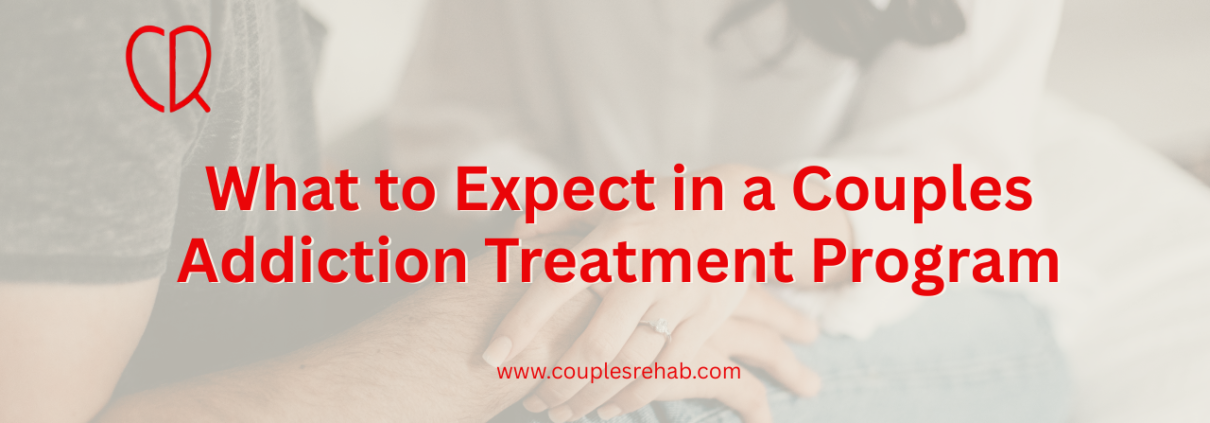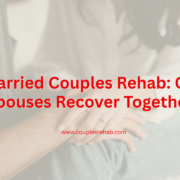When addiction affects a relationship, the path to recovery often requires addressing both individual struggles and relationship dynamics simultaneously. A couples addiction treatment program offers partners the unique opportunity to heal together, rebuilding their relationship while overcoming substance use disorders. At Couples Rehab, we understand the complex interplay between addiction and relationships, providing specialized treatment approaches designed specifically for couples seeking recovery together.
Understanding Couples Addiction Treatment Program
A couples addiction treatment program is a specialized rehabilitation approach where both partners receive treatment simultaneously while working on relationship healing. Unlike traditional rehab programs that focus solely on individual recovery, couples rehab addresses the unique dynamics of addiction within relationships, recognizing that substance abuse affects both partners, even when only one person struggles with addiction directly.
These programs allow couples to:
- Learn recovery skills together
- Address relationship issues that may contribute to substance use
- Develop healthy communication patterns
- Create a foundation for mutual support in sobriety
- Rebuild trust damaged by addiction
For many couples, addiction becomes intertwined with relationship patterns, making separate treatment less effective. Couples treatment provides the tools to break destructive cycles while strengthening the relationship foundation.
Key Benefits of Couples Addiction Treatment Program
Choosing to enter treatment as a couple offers several distinct advantages that can significantly enhance recovery outcomes for both partners:
Mutual Accountability: When both partners commit to treatment together, they create a powerful accountability system. Each person’s recovery strengthens the other’s, creating positive reinforcement that can help prevent relapse.
Addressing Relationship Triggers: Many addiction patterns are triggered by relationship dynamics. Couples treatment identifies specific interactions, conflicts, or emotional patterns that may contribute to substance use, allowing partners to develop healthier alternatives together.
Enhanced Communication Skills: Treatment provides structured opportunities to learn and practice effective communication techniques specifically designed for addiction recovery. These skills help couples discuss difficult emotions, set boundaries, and express needs without triggering conflict.
Shared Recovery Language: Partners develop a common understanding of addiction and recovery concepts, creating a shared vocabulary that facilitates deeper connection and mutual support.
Rebuilding Intimacy: As substance use decreases, couples learn to rebuild emotional and physical intimacy that may have been damaged during active addiction, restoring a crucial element of relationship health.
Unified Recovery Environment: Treatment creates alignment in recovery goals and approaches, ensuring both partners are moving in the same direction rather than working at cross-purposes.
At Couples Rehab, we’ve witnessed how these benefits create a foundation for lasting recovery that extends beyond what many individuals achieve in separate treatment programs.
Different Stages of Recovery in Couples Addiction Treatment Program
The journey through a couples addiction treatment program typically progresses through several distinct phases, each building upon the previous stage to create lasting recovery:
Assessment and Stabilization
The process begins with comprehensive individual and relationship assessments. Medical professionals evaluate each partner’s physical and psychological health, substance use history, and any co-occurring mental health conditions. Simultaneously, relationship therapists assess communication patterns, relationship history, and dysfunctional dynamics.
For couples with significant physical dependence, medical detoxification may be necessary before therapeutic work begins. This stage focuses on creating physical and emotional stability as the foundation for deeper healing work.
Early Recovery and Education
Once stabilized, couples enter an intensive educational phase. Partners learn about:
- The neurobiology of addiction
- How substances affect behavior and emotions
- Identifying personal triggers and risk factors
- Recognizing relationship patterns that enable addiction
- Developing initial coping strategies for cravings and stress
This knowledge forms the foundation for understanding addiction as a health condition rather than a moral failing, reducing shame and blame that often damage relationships affected by addiction.
Intensive Therapeutic Work
With education establishing a foundation, couples engage in deeper therapeutic work addressing both individual and relationship healing:
- Individual therapy helps each partner explore personal trauma, mental health challenges, and behavioral patterns that contribute to addiction
- Couples therapy addresses relationship dynamics, communication problems, and rebuilding trust
- Group therapy provides peer support and reduces isolation
- Family therapy may address broader family system issues when appropriate
This phase often includes specialized therapeutic approaches such as Cognitive Behavioral Therapy (CBT), Emotionally Focused Therapy (EFT), and other evidence-based modalities.
Relapse Prevention and Relationship Strengthening
As treatment progresses, the focus shifts to building sustainable recovery strategies and strengthening relationship resilience:
- Developing detailed relapse prevention plans that include partner support
- Practicing communication skills during triggering situations
- Creating meaningful rituals to replace substance use behaviors
- Building a recovery-supportive lifestyle together
- Establishing healthy boundaries that support sobriety
Transition Planning and Aftercare
The final formal treatment stage prepares couples for the transition back to daily life:
- Connecting with community support resources
- Developing a structured aftercare plan
- Identifying potential challenges and solutions
- Creating accountability systems
- Scheduling follow-up care and ongoing therapy
At Couples Rehab, we emphasize that recovery continues long after formal treatment ends, which is why comprehensive aftercare planning is essential for long-term success.
Types of Therapy Used in Couples Addiction Treatment Program
Effective couples addiction treatment incorporates multiple therapeutic approaches, each addressing different aspects of addiction and relationship healing:
Behavioral Couples Therapy (BCT): This evidence-based approach specifically developed for addiction focuses on:
- Creating a “recovery contract” between partners
- Implementing daily trust discussions
- Teaching communication skills specific to addiction recovery
- Reinforcing positive behaviors that support sobriety
Research shows BCT significantly reduces substance use and improves relationship satisfaction compared to individual-only treatment.
Emotionally Focused Therapy (EFT): This approach helps couples:
- Identify negative interaction patterns
- Access underlying emotions driving conflict
- Create secure emotional bonds
- Develop healthier attachment styles
EFT is particularly effective for rebuilding emotional intimacy damaged by addiction.
Cognitive Behavioral Therapy (CBT): While often used individually, CBT techniques help couples:
- Identify and challenge distorted thinking patterns about substances and relationships
- Develop healthier coping strategies for stress and cravings
- Recognize how thoughts influence feelings and behaviors
- Create practical problem-solving strategies
Motivational Interviewing: This technique helps partners:
- Resolve ambivalence about change
- Build intrinsic motivation for recovery
- Support each other’s change process
- Navigate differing levels of readiness for change
Psychoeducational Groups: These structured sessions provide essential information about:
- Addiction science and recovery principles
- Relationship skills development
- Relapse prevention techniques
- Self-care strategies
Trauma-Informed Therapies: Since many addiction cases involve underlying trauma, approaches like:
- EMDR (Eye Movement Desensitization and Reprocessing)
- Somatic experiencing
- Trauma-focused CBT
These help address unresolved trauma that may contribute to substance use and relationship difficulties.
At Couples Rehab, treatment plans incorporate the specific combination of therapies most appropriate for each couple’s unique situation, creating personalized healing journeys.
Common Challenges Faced in Couples Addiction Treatment
While couples addiction treatment programs offer powerful healing opportunities, they also present distinct challenges that must be addressed:
Differing Motivation Levels: Partners often enter treatment with varying levels of commitment to change. One may be fully committed to sobriety while the other remains ambivalent, creating tension and potential resistance.
Uneven Substance Use Patterns: In many couples, one partner may have more severe addiction issues than the other, creating imbalanced recovery needs. Addressing both partners’ needs appropriately requires sophisticated treatment planning.
Unhealthy Relationship Dynamics: Long-standing patterns of codependency, enabling behaviors, or controlling behaviors must be identified and changed. These entrenched dynamics often resist change, requiring patience and skilled therapeutic intervention.
Trust Rebuilding: Addiction frequently damages trust through deception, broken promises, and unreliability. Rebuilding trust takes considerable time and consistent effort, with partners often moving at different paces in the forgiveness process.
Trauma Resolution: Many individuals with substance use disorders have experienced trauma, which can complicate recovery and relationship healing. When both partners have trauma histories, treatment becomes more complex.
Addressing Intimacy Issues: Substance use often serves as a substitute for emotional intimacy or as self-medication for intimacy difficulties. Couples must learn to connect emotionally and physically without substances, which can be uncomfortable and challenging.
Relapse Risk Management: When one partner relapses, it significantly impacts the other partner and the relationship. Treatment must prepare couples for this possibility and develop appropriate response strategies.
Balancing Individual and Relationship Needs: Effective treatment requires addressing both individual recovery and relationship healing, which sometimes creates competing priorities that must be carefully balanced.
At Couples Rehab, our experienced clinical team specializes in navigating these common challenges, providing targeted interventions that address the specific obstacles each couple faces.

Success Rates of Couples Addiction Treatment Program Compared to Individual Rehab
Research on addiction treatment outcomes consistently shows promising results for couples-based approaches compared to individual-only treatment:
Improved Substance Use Outcomes: Studies show that couples who participate in behavioral couples therapy have significantly higher abstinence rates than those in individual treatment alone. One landmark study found that couples treatment resulted in 60% abstinence rates compared to 30% in individual treatment at one-year follow-up.
Better Relationship Functioning: Couples who complete treatment together report greater relationship satisfaction, improved communication, and reduced relationship conflict compared to couples where only one partner receives treatment.
Reduced Domestic Conflict: Research demonstrates that couples addiction treatment significantly reduces instances of intimate partner violence and serious relationship conflict, creating safer home environments.
Enhanced Treatment Retention: Couples approaches show better program completion rates than individual treatment, with partners providing motivation and accountability that increases program adherence.
Lower Relapse Rates: Long-term follow-up studies indicate that couples who complete treatment together maintain sobriety at higher rates over time, with some studies showing relapse rates reduced by up to 40% compared to individual treatment.
Cost-Effectiveness: While couples treatment may initially require more resources, the improved outcomes and lower relapse rates make it more cost-effective over time compared to repeated individual treatment episodes.
It’s important to note that success rates vary based on:
- The severity and duration of addiction
- The presence of co-occurring mental health conditions
- The quality of the relationship prior to treatment
- The specific treatment approaches used
- The length and intensity of treatment
At Couples Rehab, we carefully track outcomes data to continuously improve our treatment approaches, ensuring we deliver the most effective care possible for couples seeking recovery.
Daily Schedule in an Inpatient Couples Addiction Treatment Program
Understanding what to expect in a residential couples program helps partners prepare for the intensive work ahead. While schedules vary between facilities, here’s a typical day at Couples Rehab’s inpatient program:
6:30-7:30 AM: Morning Wellness
- Wake-up and medication management (if applicable)
- Individual mindfulness or meditation practice
- Light physical activity (yoga, stretching, or walking)
7:30-8:30 AM: Breakfast
- Nutritionally balanced meal
- Opportunity for connection with other couples
- Medication administration (if applicable)
8:30-9:30 AM: Morning Community Meeting
- Daily intention setting
- Group check-in about challenges and victories
- Review of daily schedule and announcements
9:30-11:00 AM: Primary Group Therapy
- Themed therapeutic groups (varies by day)
- Topics include recovery skills, relationship dynamics, emotional regulation, etc.
- Mix of education and process work
11:00 AM-12:00 PM: Specialized Groups
- Gender-specific groups
- Trauma-focused work
- Skill-building workshops
12:00-1:00 PM: Lunch
- Nutritious meal
- Social connection time
1:00-2:30 PM: Couples Therapy Sessions
- Joint sessions with dedicated couples therapist
- Focus on relationship-specific healing work
- Communication skill development
2:30-4:00 PM: Individual Therapy
- One-on-one sessions with primary therapist
- Addressing personal recovery goals
- Working through individual challenges
4:00-5:30 PM: Recreational Therapy or Wellness Activities
- Art therapy, music therapy, or adventure therapy
- Physical fitness activities
- Stress management practices
5:30-6:30 PM: Dinner
- Nutritionally balanced meal
- Community dining experience
6:30-8:00 PM: Evening Programming
- Recovery support meetings
- Guest speakers
- Family involvement activities (certain days)
- Relationship workshops
8:00-9:30 PM: Personal Time
- Journaling and reflection
- Connection with partner
- Phone time (as appropriate in treatment phase)
- Relaxation activities
9:30-10:00 PM: Evening Wrap-up
- Gratitude practice
- Brief check-in
- Preparation for rest
10:00 PM: Quiet Hours Begin
- Wind-down time
- Sleep prioritization for neurological healing
This structured schedule creates a healing environment that balances intensive therapeutic work with adequate rest, nutrition, and relationship connection time. Weekend schedules typically include more recreational activities and family visitation opportunities while maintaining core therapeutic elements.
Finding a Good Couples Rehab Center That Specializes in Addiction
Selecting the right couples addiction treatment program requires careful evaluation of several key factors:
Specialized Couples Expertise: Look for programs specifically designed for couples, not facilities that simply allow partners to attend the same general program. Ask about staff training in couples dynamics and relationship-focused treatment approaches.
Appropriate Licensing and Accreditation: Verify that the facility holds current state licensing and accreditation from recognized organizations like CARF (Commission on Accreditation of Rehabilitation Facilities) or The Joint Commission.
Evidence-Based Approaches: Inquire about specific evidence-based therapies used for couples addiction treatment, such as Behavioral Couples Therapy, Emotionally Focused Therapy, and other research-supported approaches.
Comprehensive Assessment Process: Quality programs conduct thorough individual and relationship assessments before creating treatment plans, rather than applying one-size-fits-all approaches.
Dual Diagnosis Capability: Since many addiction cases involve co-occurring mental health conditions, ensure the facility can effectively address these complex needs.
Continuum of Care Options: Look for programs offering multiple levels of care (detox, residential, outpatient, aftercare) to provide appropriate stepping stones through recovery.
Family Involvement Philosophy: Understand how the program involves extended family members in the treatment process, which can be crucial for long-term recovery success.
Aftercare Planning: Strong programs emphasize comprehensive discharge planning, including connections to ongoing couples therapy, support groups, and community resources.
Success Metrics: Ask about how the program measures outcomes and what their success rates look like, particularly for couples who complete treatment together.
Insurance Coverage and Financial Options: Understand costs, insurance acceptance, and payment options before committing to a program.
At Couples Rehab, we encourage potential clients to schedule a comprehensive assessment where we can answer these questions in detail and determine if our program aligns with your specific needs and recovery goals.
Cost of Couples Addiction Treatment Program
Understanding the financial aspects of couples addiction treatment helps partners plan effectively for this important investment in their health and relationship:
Typical Cost Ranges:
- Detoxification: $1,500-$5,000 per person for 5-7 days
- Inpatient/Residential Treatment: $20,000-$60,000 per couple for 30 days
- Partial Hospitalization Programs (PHP): $7,000-$15,000 per couple per month
- Intensive Outpatient Programs (IOP): $3,000-$10,000 per couple per month
- Standard Outpatient Services: $1,000-$5,000 per couple per month
Factors Affecting Cost:
- Geographic location (urban programs typically cost more)
- Facility amenities and accommodations
- Staff credentials and specialization
- Treatment approach and therapeutic offerings
- Program duration
- Level of medical services provided
- Whether private or semi-private accommodations are offered
Insurance Coverage: Many insurance plans now provide coverage for addiction treatment, though coverage varies significantly. Couples may encounter:
- Coverage for one partner but not both
- Coverage for substance use treatment but limitations on relationship therapy
- Requirements for meeting medical necessity criteria
- Limitations on treatment duration
- Network restrictions
Alternative Payment Options:
- Sliding scale fees based on income
- Payment plans with no-interest financing
- Healthcare loans from specialized lenders
- Scholarships or grants from foundations (limited availability)
- Health Savings Account (HSA) or Flexible Spending Account (FSA) funds
Cost-Saving Strategies:
- Utilizing in-network providers when possible
- Exploring step-down care options (beginning with more intensive treatment and transitioning to less intensive as appropriate)
- Combining insured clinical services with community-based support resources
At Couples Rehab, we believe financial concerns should never prevent accessing quality treatment. Our admissions team works closely with couples to maximize insurance benefits, explore payment options, and develop financial plans that make treatment accessible.
Alternatives to Residential Couples Addiction Treatment Program
While residential treatment offers the most intensive healing environment, several alternative options exist for couples unable to commit to inpatient care:
Intensive Outpatient Programs (IOPs): These structured programs typically meet 3-5 days weekly for 3-4 hours per session, allowing couples to:
- Maintain work and family responsibilities
- Sleep at home while receiving intensive treatment
- Participate in individual, couples, and group therapy
- Practice recovery skills in their natural environment
- Typically last 8-12 weeks
Partial Hospitalization Programs (PHPs): More intensive than IOPs but less restrictive than residential treatment, PHPs usually involve:
- Daily treatment (5-7 days weekly)
- 6-8 hours of programming per day
- Comprehensive therapy services
- Medical monitoring when needed
- Return home evenings and weekends
Day Treatment Programs: Similar to PHPs but often with less medical emphasis, providing:
- Structured daytime programming
- Focus on psychosocial rehabilitation
- Opportunity to practice recovery skills at home evenings
- Blend of individual, couples, and group modalities
Telehealth Couples Therapy: Increasingly sophisticated virtual treatment options include:
- Video-based therapy sessions
- Digital recovery support tools
- Flexible scheduling options
- Elimination of transportation barriers
- Access to specialists regardless of geographic location
Community-Based Programs: These local resources often include:
- Couples-focused support groups
- Recovery community organizations
- Faith-based recovery programs
- Mutual help meetings that welcome couples (specific groups)
- Educational workshops and classes
Hybrid Models: Many couples benefit from combinations of:
- Individual therapy plus couples sessions
- In-person intensive workshops with ongoing virtual support
- Professional treatment plus peer support groups
- Therapeutic retreats followed by outpatient care
When considering alternatives to residential treatment, couples should assess:
- The severity of substance use issues
- The presence of withdrawal risks requiring medical monitoring
- The stability of the home environment
- The strength of local support systems
- The flexibility of work and family obligations
At Couples Rehab, we offer multiple levels of care to accommodate different needs and circumstances, helping couples find the right treatment intensity for their specific situation.
Frequently Asked Questions About Couples Addiction Treatment
1. Can we participate in couples rehab if only one partner has an addiction?
Yes. Many couples enter treatment when only one partner struggles with substance use. The non-addicted partner participates as a support person while learning about addiction, communication skills, and how to establish healthy boundaries. This approach recognizes that addiction affects the entire relationship system, not just the individual using substances.
2. Will we share accommodations during residential treatment?
It depends on the facility. Some couples programs offer shared rooms for partners, while others provide separate accommodations while still delivering couples-focused treatment. At Couples Rehab, we assess each couple’s dynamics to determine the most therapeutic living arrangement during treatment.
3. What happens if one partner relapses during treatment?
Treatment continues with adjustments. Relapse is addressed as a learning opportunity rather than program failure. The treatment team will reassess the individual’s needs, potentially intensifying certain treatment components while continuing to involve the partner in the recovery process with appropriate boundaries.
4. Is couples treatment appropriate if our relationship involves domestic violence?
It requires careful assessment. When domestic violence is present, thorough evaluation determines whether couples treatment is appropriate or if separate treatment with specialized domestic violence intervention is needed first. Safety always takes priority in these situations.
5. How do we maintain recovery progress after completing a program?
Through comprehensive aftercare. Successful programs provide detailed continuing care plans that include ongoing couples therapy, support group participation, relapse prevention strategies, and connection to community resources. Some programs offer alumni support services and periodic check-ins to reinforce recovery gains.
Conclusion: Building a Foundation for Lasting Recovery Together
A couples addiction treatment program offers partners the rare opportunity to heal both individually and relationally, addressing the complex interplay between substance use and relationship dynamics. By choosing to recover together, couples can transform one of life’s greatest challenges into a powerful catalyst for relationship growth and renewal.
At Couples Rehab, we’ve witnessed countless partnerships emerge stronger from the addiction recovery journey, having developed communication skills, emotional intimacy, and mutual support practices that sustain both sobriety and relationship satisfaction. Our comprehensive approach addresses the full spectrum of needs—physical, emotional, psychological, and relational—creating a foundation for lasting wellness.
Recovery is not merely about abstaining from substances; it’s about creating a relationship that fulfills both partners’ needs without relying on unhealthy coping mechanisms. Through specialized couples addiction treatment, partners learn to support each other’s individual healing while rebuilding a connection based on honesty, trust, and healthy interdependence.
If you and your partner are struggling with addiction, remember that seeking help together represents tremendous courage and commitment to both your relationship and individual wellbeing. The path of recovery may be challenging, but walking it together can lead to a level of connection and fulfillment many couples describe as transformative.
For more information about our couples addiction treatment programs or to schedule a confidential assessment, contact Couples Rehab today. Your journey toward healing together can begin with a single step.











